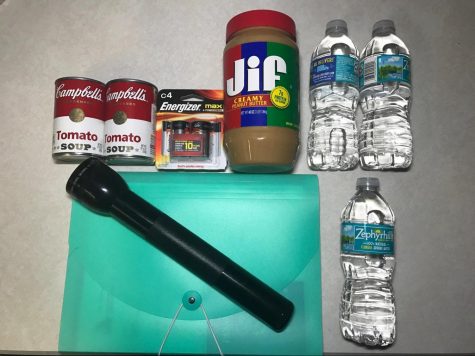Since it is now peak hurricane season, it’s always important to be prepared in case we have a repeat of Irma and Matthew. Florida is currently not under any hurricane watches or warnings, but it’s always important to be prepared.
Preparing for natural disasters is different when you live on campus, but there are still supplies you can have on hand that will help you be ready for any situation.

- Water
Water is essential. During the hurricane season, stores tend to run out quickly. Always keep at least enough water to last you for a few days in case of a power outage and running water isn’t an option. The recommended amount from the government website about disaster readiness is, at least, one gallon per person per day. If you want to go one step beyond, fill a large container with water that can be used for flushing toilets or bathing, while keeping your drinking water separate.
- Batteries & Flashlights
In instances of stronger natural disasters, there is very real possibility that the power will go out. It could be for less than an hour or could be multiple days, but it’s important to keep spare batteries around to use in flashlights and radios. Since candles are typically not allowed in dorm rooms, flashlights and lanterns are the best options for light sources. For items that don’t take batteries, like cell phones, charge your device ahead of time, including any additional power banks you may have so you can have a way to communicate with family and stay aware of any updates.
- Food
If the power goes out, you won’t have a way of cooking and last time we checked, portable stoves were on the “do not bring” list for dorm rooms. Stock up on items like bread, peanut butter, jelly – anything considered non-perishable. Be sure to get enough to last a few days but don’t eat all the good snacks before the storm arrives (we’re all guilty of that.)
- Important Documents
You likely didn’t bring your birth certificate to college with you, but any important documents you may have need to be kept together and in an easily accessible area. Examples of important documents include insurance paperwork or a social security card. In the case that an evacuation is imminent, you want those documents with you at all times. Rumors circulating social media during Irma said keeping important documents and objects in dishwashers was a good idea because they could be tightly sealed. According to the fact checking website Snopes, this is NOT true; just because dishwashers are designed to keep water in, doesn’t mean they can keep water out during a flood.
- First Aid Kit
Keep a container stocked with items like Band-Aids, any important medications, bandages, gauze dressings, medical tape, gloves, tweezers and anything else that could be necessary in a minor medical situation. For a serious medical situation, contact emergency services immediately.
- Go Bag
In the unlikely event of a mandatory evacuation on campus, have a bag ready to take with you. Clean clothes, hygiene products, extra chargers, a blanket and your first aid kit are your immediate needs in an emergency situation.
- Have an Evacuation Plan
Have an evacuation plan. During Irma last year, students who stayed on campus were sheltered at the Fountains if they did not have off-campus options. UNF was not in an evacuation zone so there was no need to move remaining students to other shelters. If you have friends or family that live nearby in a safe area, consider staying with them. Be aware that bridge closures happen during major storms so leave with enough time to arrive safely. Let any resident advisors know of your plans to evacuate.
Most importantly, be aware of any updates or changes from verified information sites like the National Hurricane Center. New updates are posted frequently. For more information on UNF’s Emergency Response Plan, you can check here.
—
For more information or news tips, or if you see an error in this story or have any compliments or concerns, contact editor@unfspinnaker.com.











